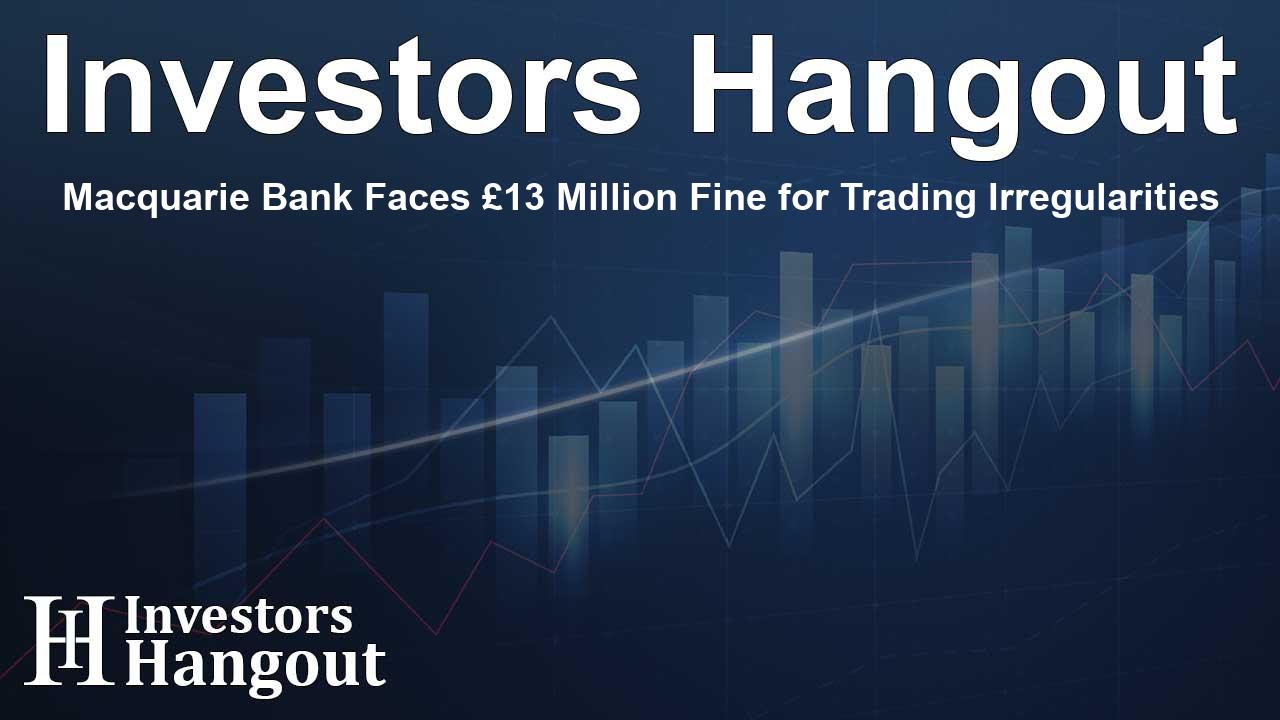Macquarie Bank Faces £13 Million Fine for Trading Irregularities

Macquarie Bank's Trading Control Failures
Recently, Macquarie Bank Limited's London branch faced significant consequences from the UK's Financial Conduct Authority (FCA). The regulator imposed a hefty fine of £13 million due to serious trading control failures that allowed a trader to conduct over 400 fictitious trades over a span of nearly two years. This situation highlights crucial vulnerabilities in banking regulations and oversight.
The Nature of the Violations
Between June 2020 and February 2022, Travis Klein, a trader within the bank's Metals and Bulks Trading Desk, was involved in deceptive practices aimed at concealing substantial trading losses. By manipulating the bank's internal systems, he executed multiple fake trades to mask losses and mislead his supervisors. These fraudulent activities significantly impacted the bank, resulting in an estimated $57.8 million required to rectify the situation.
Regulatory Findings
The FCA's investigation revealed that Macquarie Bank's existing systems were inadequate for preventing or detecting such severe misconduct, even after earlier warnings about control weaknesses were provided. Klein's actions illustrated how he circumvented three critical internal safeguards without triggering alarms, exposing substantial gaps in the bank's compliance framework.
Consequences for Klein
Klein, who had been with Macquarie since 2017 and held a certification for client-dealing roles, faced severe repercussions for his behavior. Eventually, he was banned from working in the financial services sector for acting dishonestly and lacking integrity. Initially, he was set to be fined £72,000, but due to financial hardship, this penalty was waived. The case serves as a pertinent reminder about the importance of ethical conduct in the financial sector.
The Financial Impact
The repercussions of Klein's actions cost the bank millions. The bank’s management is now facing scrutiny over the apparent weaknesses in their operating systems that allowed such fraudulent activities to occur unchecked. As noted by Steve Smart, the joint executive director of enforcement at the FCA, organizations must understand that vulnerabilities could arise from internal sources. Thus, maintaining robust control systems is critical for early detection of potential risks.
Lessons Learned
This incident sheds light on the necessity for organizations to prioritize compliance and risk management. The financial repercussions of failing to address internal weaknesses can be devastating, as seen in Macquarie Bank's situation. Such cases emphasize the need for ongoing assessments and updates to trading systems to align with the ever-evolving regulatory landscape.
Macquarie Bank's Global Operations
Macquarie Bank operates on a global scale, with its London branch being authorized by the FCA since 2001. The firm has made its mark in investment banking, asset management, and financial services across several sectors. However, the recent fines underscore the need for continual improvement and vigilance within organizational structures to prevent future lapses in regulatory compliance.
Frequently Asked Questions
What led to the fine imposed on Macquarie Bank?
The fine resulted from serious trading control failures that allowed a trader to execute fictitious trades, concealing significant losses.
How much was the fine amount for Macquarie Bank?
Macquarie Bank was fined £13 million, reduced from an initial amount of £18.6 million after cooperating with the investigation.
Who was the trader involved in this incident?
The trader responsible for the fictitious trades was Travis Klein, who worked in the Metals and Bulks Trading Desk at Macquarie Bank.
What actions were taken against Travis Klein?
Travis Klein was banned from the financial services sector due to his dishonest actions and lack of integrity during his employment.
Why is this incident significant for financial regulations?
This incident highlights the importance of maintaining robust internal control systems within financial institutions to prevent fraud and ensure regulatory compliance.
About The Author
Contact Owen Jenkins privately here. Or send an email with ATTN: Owen Jenkins as the subject to contact@investorshangout.com.
About Investors Hangout
Investors Hangout is a leading online stock forum for financial discussion and learning, offering a wide range of free tools and resources. It draws in traders of all levels, who exchange market knowledge, investigate trading tactics, and keep an eye on industry developments in real time. Featuring financial articles, stock message boards, quotes, charts, company profiles, and live news updates. Through cooperative learning and a wealth of informational resources, it helps users from novices creating their first portfolios to experts honing their techniques. Join Investors Hangout today: https://investorshangout.com/
The content of this article is based on factual, publicly available information and does not represent legal, financial, or investment advice. Investors Hangout does not offer financial advice, and the author is not a licensed financial advisor. Consult a qualified advisor before making any financial or investment decisions based on this article. This article should not be considered advice to purchase, sell, or hold any securities or other investments. If any of the material provided here is inaccurate, please contact us for corrections.
